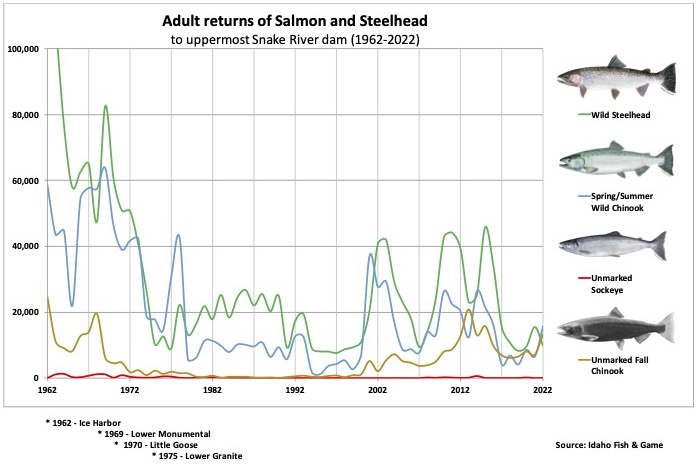forum
library
tutorial
contact

President Pledges Support
for Salmon Recovery
by Eric Barker
Challis Messenger, April 27, 2023
|
the film forum library tutorial contact |

|
President Pledges Support
by Eric Barker
|
President says he'll work with tribal and
political leaders to recover endangered fish runs
 President Joe Biden pledged to work with tribal and political leaders of the Pacific Northwest to recover salmon runs that spawn in the Columbia River and its tributaries.
President Joe Biden pledged to work with tribal and political leaders of the Pacific Northwest to recover salmon runs that spawn in the Columbia River and its tributaries.
"I'm also committed to working with the tribal leaders here, as well as Senator Patty Murray, Maria Cantwell and Representative Mike Simpson to bring healthy and abundant salmon runs back to the Colorado River system," Biden said at a recent fish summit.
Representatives of Native American Indian tribes from across the country attended the summit including Samuel N. Penney, chairperson of the Nez Perce Tribe and tribal vice chairperson Shannon Wheeler.
"There is a lot of electricity in the air here and the feeling that things are happening and things are getting done," Wheeler said in a phone interview with the Lewiston Tribune. Wheeler said the federal government has an obligation to deliver on the promises made in tribal treaties. Too often, those promises have not been met, he said.
"Treaties are made for mutual benefit and mutual benefits should come to both sides of the agreement," Wheeler said.
Salmon fishing is central to the culture and economy of the Nez Perce Tribe. Its 1855 treaty with the U.S. government reserves the right of its members to fish for salmon in "usual and accustomed places." But that is becoming increasingly difficult. Wild Snake River salmon and steelhead have been in decline for decades and are protected under the Endangered Species Act. For more than 20 years the tribe, along with Oregon and a coalition of fishing and conservation groups, has advocated breaching the four lower Snake River dams that impede the migration of juvenile and adult salmon and steelhead as they move between spawning grounds in Idaho, Washington and Oregon and the Pacific Ocean.
The federal government has not endorsed that move, instead opting for a series of smaller actions like inland habitat restoration, hatchery and harvest reform and minor tweaks to the hydropower system.
Two years ago, Rep. Simpson released a $33.5 billion plan that would breach the dams and invest in affected communities and industries across the Northwest. The concept, which has not been introduced as legislation, failed to gain traction with other members of Congress and some like Fulcher and Cathy McMorris Rodgers of eastern Washington are bitterly opposed to the idea. But it was endorsed by the Nez Perce and other tribes, who have lobbied vigorously for it.
Washington Gov. Jay Inslee and Sen. Murray, both Washington Democrats, spent more than a year studying breaching before saying it would help the fish but is not feasible until services provided by the dams -- transportation and hydroelectric power generation -- are replaced.
Last year, a draft report from NOAA Fisheries said wild Snake River salmon and steelhead cannot be recovered to healthy and harvestable levels without dam breaching and a suite of other actions. However, the agency's official policy is that the fish can be removed from federal protection, a lower threshold than achieving healthy and harvestable levels, with the dams in place.
The Nez Perce Tribe has been a key player in a long-running court case pitting it, Oregon and fishing and conservation groups against the federal government over its efforts to balance the needs of the fish with operation of dams on the Snake and Columbia rivers.
For more than a year, the parties to that litigation have participated in closed-door mediation in an attempt to forge a durable solution to the problems facing salmon and steelhead. While the Biden administration has not backed breaching, the federal government has been more open to the idea under its leadership. Breaching would help the fish but it would end tug-and-barge transportation of crops like wheat between Lewiston and downriver ports and eliminate hydroelectric generation at the dams, complicating the region's effort to decarbonize its energy system.
learn more on topics covered in the film
see the video
read the script
learn the songs
discussion forum
